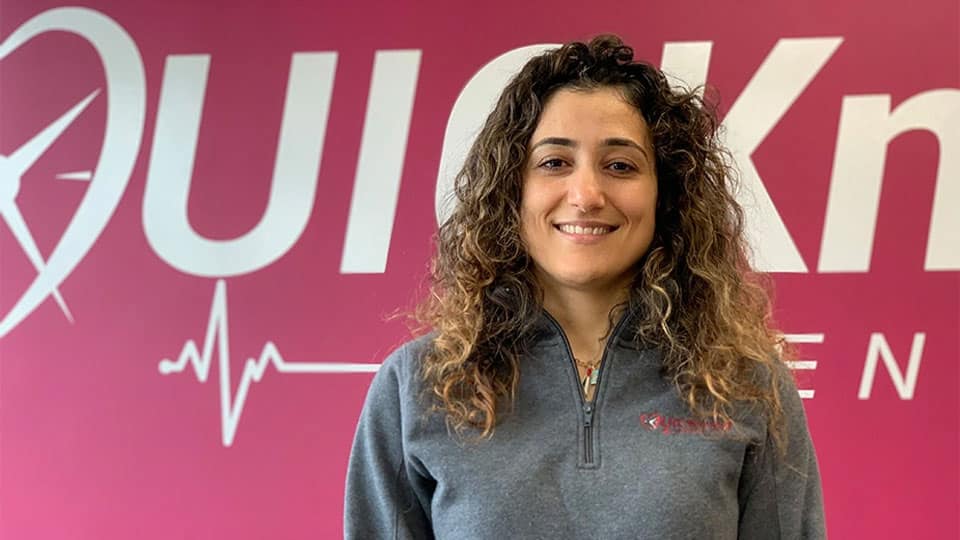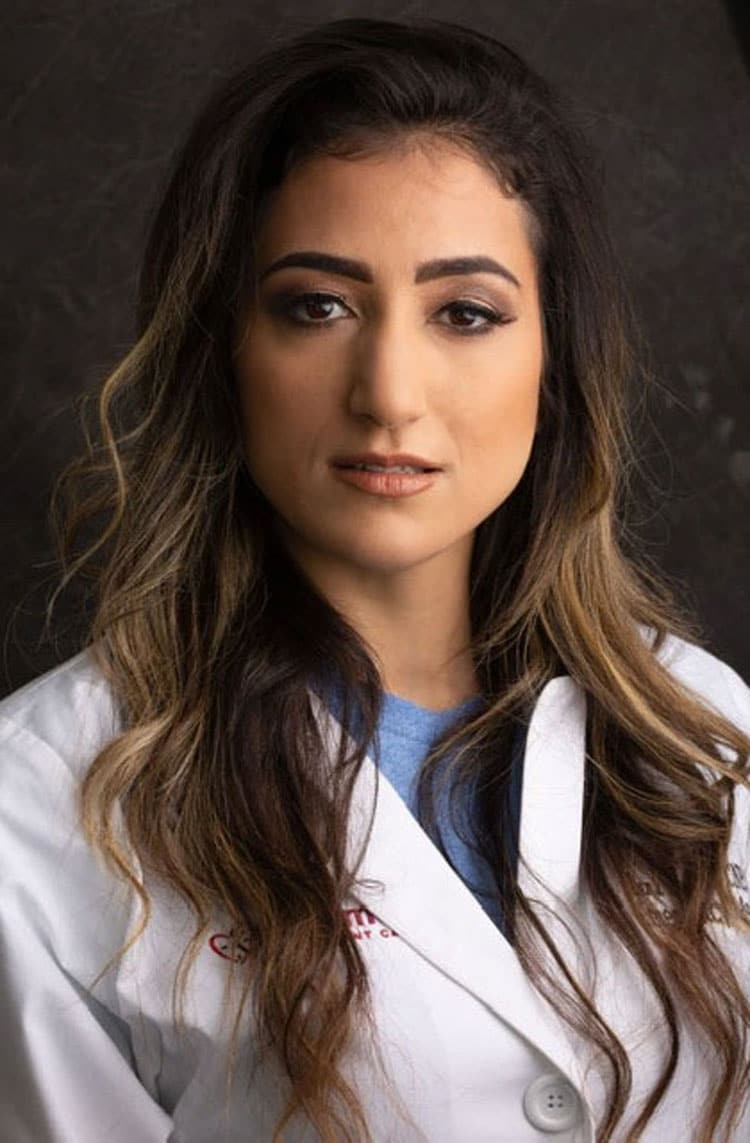Lena Esmail: The Journey from Nursing to CEO of QuickMed

Lena Esmail is the founder and CEO of QuickMed, a pioneering healthcare organization dedicated to improving access to medical services in underserved and rural communities. With a background in nursing and healthcare management, Lena established QuickMed in 2018 in her hometown of Youngstown, Ohio, where she identified significant gaps in healthcare delivery. Her vision is to bring equitable, high-quality care to communities that often struggle with limited access to healthcare services.
Lena earned dual bachelor’s degrees in Nursing and Biology from Youngstown State University and furthered her education with a master’s degree in Family Practice Nursing from Ursuline College, followed by a Doctorate in Nursing Practice from Kent State University. Her passion for healthcare innovation has driven the development of QuickMed’s model, which integrates telemedicine and advanced practice providers to offer comprehensive care tailored to the needs of underserved populations.
In addition to her leadership at QuickMed, Lena has been a strong advocate for in-school clinics, where children in underprivileged areas can receive vital healthcare services. Her hands-on leadership style and dedication to improving health equity have earned her recognition within the healthcare industry.
Lena is also passionate about community engagement and education, believing that healthcare is a fundamental right. Outside of her professional responsibilities, she is a devoted mother and enjoys spending time with her family, giving back to her community, and promoting sustainability and environmental health.
What inspired you to pursue a career in healthcare?
My inspiration for healthcare comes from my upbringing in Youngstown, Ohio. I grew up in an underserved community, where access to quality healthcare was a real challenge. Seeing people struggle with basic health needs sparked something in me early on. I realized I wanted to help bridge that gap and make a tangible difference in people’s lives. Nursing felt like the most direct way to do that, and it became the foundation for everything I’ve built in my career.
What’s one piece of advice you would give to someone just starting their career?
Don’t rush the process. I know it’s tempting to want to make an immediate impact and see quick success, but meaningful growth takes time. Whether you’re a healthcare professional or in another field, take the time to learn, ask questions, and embrace the challenges. The early days of your career are about building a strong foundation, so don’t worry if things aren’t happening as fast as you want. Trust the process and focus on gaining experience and knowledge.
What’s something you wish you had known earlier in your educational journey?
I wish I had known that it’s okay to take a step back and reevaluate. In school, I felt like I had to move quickly from one degree to the next without pausing to reflect on what I really wanted. Looking back, I realize that taking time to assess your goals and recalibrate is crucial. Education isn’t a race—it’s about finding what drives you and honing in on that passion.
How important is mentorship in shaping one’s career?
Mentorship is absolutely essential. Early in my career, I had mentors who guided me through the complexities of healthcare and helped me understand the bigger picture. A good mentor won’t just teach you the technical skills—you’ll also learn about leadership, work ethic, and how to navigate the challenges that inevitably come your way. I encourage anyone starting out to find a mentor who aligns with their goals and values.

What did you find most challenging about transitioning from education to the workforce?
The biggest challenge was learning to apply theoretical knowledge in real-world situations. School can only prepare you so much for the emotional and logistical challenges that come with working in healthcare. For example, dealing with a critical patient or managing a difficult situation isn’t something you can fully understand from textbooks. The transition was tough, but it taught me the importance of being adaptable and staying calm under pressure.
How did your education influence the way you lead today?
My education was fundamental in shaping my leadership style. The balance between my studies in biology and nursing gave me both a scientific and a human-centered perspective, which I carry with me in my role at QuickMed. I lead with empathy, and I always consider the individual needs of patients and staff. Education taught me the importance of critical thinking, but my real-world experience taught me how to combine that with compassion.
What’s one habit that helped you succeed early in your career?
Being proactive about my learning. I was never content with just completing my required coursework or tasks. I always sought out additional resources, stayed up-to-date with industry trends, and took on new challenges whenever possible. In healthcare, things evolve rapidly, and it’s critical to stay ahead of the curve, whether it’s learning about new medical advancements or adapting to new technologies like telemedicine.
How did you handle setbacks early in your career?
I treated setbacks as learning opportunities. There were definitely times when things didn’t go as planned—whether it was a project that failed or a goal I didn’t reach in time. Instead of letting those moments discourage me, I reflected on what went wrong and used them to improve. Failure is inevitable in any career, but how you respond to it defines your path forward. Don’t be afraid to fail; be afraid of not learning from those failures.
What advice would you give to students trying to decide on their career path?
Follow your passion, but also be practical. I always tell students to find the intersection between what they love and what’s needed in the world. For me, it was healthcare—I was passionate about helping people, and I saw a real need for better access to medical services. It’s important to choose a career that motivates you, but also one where you can make a meaningful impact.
What do you think is the most important skill to develop early in your career?
Adaptability. The world is constantly changing, and the ability to pivot when necessary is crucial. Whether it’s learning a new skill, embracing a new technology, or adjusting to an unexpected situation, being flexible and open to change will serve you well throughout your career. The more adaptable you are, the more resilient you become, and that’s something that will carry you through even the toughest times.
What’s the best way to stand out early in your career?
Be willing to go the extra mile and always take initiative. When I was just starting, I made it a point to look for ways to add value beyond what was expected of me. Whether it was volunteering for additional responsibilities or offering solutions to problems that weren’t directly my own, I showed that I was invested in the bigger picture. It’s not about doing more work for the sake of it, but about showing that you’re a proactive, solution-oriented person.
How do you maintain a work-life balance, especially in the early stages of a career?
It’s definitely challenging, but it’s all about setting boundaries and learning to prioritize. Early in my career, I didn’t always have a perfect balance—I was often too focused on work. Over time, I learned that taking care of myself outside of work is just as important. I always recommend scheduling personal time as you would with any work task. It may sound rigid, but it ensures you give equal attention to both your personal and professional life. Balance isn’t something you find—it’s something you create.
What role has networking played in your career development?
Networking has been incredibly important in my career. Building relationships with others in your field opens doors to opportunities you might not even realize exist. Early on, I made sure to connect with other healthcare professionals, attend events, and engage with my peers. These connections not only gave me career opportunities but also provided a strong support system. Networking isn’t just about what others can do for you—it’s about building a community where you can both give and receive guidance.
Have you read?
Best SOC 2 Compliance Software List.
OpenAI Doubles Valuation to $157 Billion After Record-Breaking Funding Round.
America’s Health Authorities Expand PAHO Funds to Boost Regional Self-Sufficiency and Innovation.
93% of Indian CEOs Expect to Increase Their Headcount, KPMG Finds.
In Massachusetts, Abigail Johnson, With a Net Worth of $31.3 Billion, is More Than 10 Times Wealthier Than Oprah Winfrey.
Bring the best of the CEOWORLD magazine's global journalism to audiences in the United States and around the world. - Add CEOWORLD magazine to your Google News feed.
Follow CEOWORLD magazine headlines on: Google News, LinkedIn, Twitter, and Facebook.
Copyright 2025 The CEOWORLD magazine. All rights reserved. This material (and any extract from it) must not be copied, redistributed or placed on any website, without CEOWORLD magazine' prior written consent. For media queries, please contact: info@ceoworld.biz








